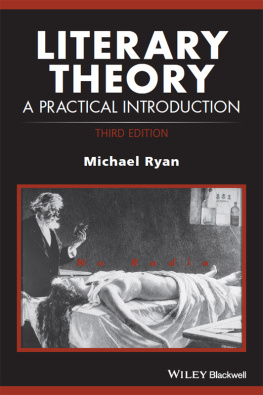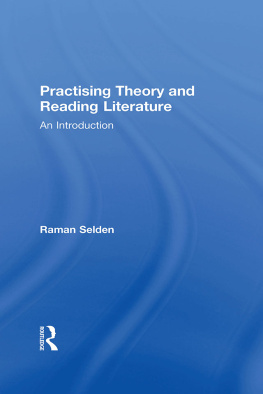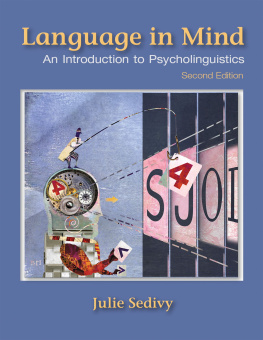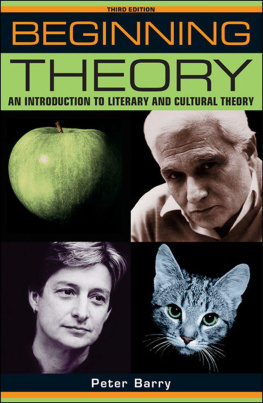Rivkin Julie - Literary theory a practical introduction
Here you can read online Rivkin Julie - Literary theory a practical introduction full text of the book (entire story) in english for free. Download pdf and epub, get meaning, cover and reviews about this ebook. City: New York;USA, year: 2017;2016, publisher: John Wiley & Sons, Incorporated;Wiley-Blackwell, genre: Romance novel. Description of the work, (preface) as well as reviews are available. Best literature library LitArk.com created for fans of good reading and offers a wide selection of genres:
Romance novel
Science fiction
Adventure
Detective
Science
History
Home and family
Prose
Art
Politics
Computer
Non-fiction
Religion
Business
Children
Humor
Choose a favorite category and find really read worthwhile books. Enjoy immersion in the world of imagination, feel the emotions of the characters or learn something new for yourself, make an fascinating discovery.
- Book:Literary theory a practical introduction
- Author:
- Publisher:John Wiley & Sons, Incorporated;Wiley-Blackwell
- Genre:
- Year:2017;2016
- City:New York;USA
- Rating:3 / 5
- Favourites:Add to favourites
- Your mark:
- 60
- 1
- 2
- 3
- 4
- 5
Literary theory a practical introduction: summary, description and annotation
We offer to read an annotation, description, summary or preface (depends on what the author of the book "Literary theory a practical introduction" wrote himself). If you haven't found the necessary information about the book — write in the comments, we will try to find it.
Literary theory a practical introduction — read online for free the complete book (whole text) full work
Below is the text of the book, divided by pages. System saving the place of the last page read, allows you to conveniently read the book "Literary theory a practical introduction" online for free, without having to search again every time where you left off. Put a bookmark, and you can go to the page where you finished reading at any time.
Font size:
Interval:
Bookmark:

How to Study Literature
The books in this series all written by eminent scholars renowned for their teaching abilities show students how to read, understand, write, and criticize literature. They provide the key skills which every student of literature must master, as well as offering a comprehensive introduction to the field itself.
Published
How to Study Theory Wolfgang Iser
How to Write a Poem John Redmond
How to Read a Shakespeare Play David Bevington
How to Read the Victorian Novel George Levine
How to Read World Literature David Damrosch
Literary Theory A Practical Introduction Julie Rivkin and Michael Ryan
THIRD EDITION
Michael Ryan

This third edition first published 2017
2017 John Wiley & Sons Ltd
Edition history: Blackwell Publishing Ltd (1e, 1999); Blackwell Publishing Ltd (2e, 2007)
Registered Office
John Wiley & Sons Ltd, The Atrium, Southern Gate, Chichester, West Sussex, PO19 8SQ, UK
Editorial Offices
350 Main Street, Malden, MA 02148-5020, USA
9600 Garsington Road, Oxford, OX4 2DQ, UK
The Atrium, Southern Gate, Chichester, West Sussex, PO19 8SQ, UK
For details of our global editorial offices, for customer services, and for information about how to apply for permission to reuse the copyright material in this book please see our website at www.wiley.com/wiley-blackwell.
The right of Michael Ryan to be identified as the author of this work has been asserted in accordance with the UK Copyright, Designs and Patents Act 1988.
All rights reserved. No part of this publication may be reproduced, stored in a retrieval system, or transmitted, in any form or by any means, electronic, mechanical, photocopying, recording or otherwise, except as permitted by the UK Copyright, Designs and Patents Act 1988, without the prior permission of the publisher.
Wiley also publishes its books in a variety of electronic formats. Some content that appears in print may not be available in electronic books.
Designations used by companies to distinguish their products are often claimed as trademarks. All brand names and product names used in this book are trade names, service marks, trademarks or registered trademarks of their respective owners. The publisher is not associated with any product or vendor mentioned in this book.
Limit of Liability/Disclaimer of Warranty: While the publisher and authors have used their best efforts in preparing this book, they make no representations or warranties with respect to the accuracy or completeness of the contents of this book and specifically disclaim any implied warranties of merchantability or fitness for a particular purpose. It is sold on the understanding that the publisher is not engaged in rendering professional services and neither the publisher nor the author shall be liable for damages arising herefrom. If professional advice or other expert assistance is required, the services of a competent professional should be sought.
Library of Congress Cataloging-in-Publication Data is available for this title
Hardback ISBN: 9781119090021
Paperback ISBN: 9781119061755
A catalogue record for this book is available from the British Library.
Cover image: Barbara Kruger: Untitled (No Radio), photograph 51 68, 1988.
Collection Don/Doris Fisher, San Francisco, courtesy Mary Boone Gallery, New York
For E. P. Kuhl and Robert Scholes, for teaching me how to read
Note to Teachers
This book should be used with the following literary texts:
Elizabeth Bishop, The Complete Poems
Elizabeth Bishop, In the Village (see Appendix)
Joseph Conrad, Heart of Darkness
Kiran Desai, The Inheritance of Loss
Louise Erdrich, Love Medicine
F. Scott Fitzgerald, The Great Gatsby
Toni Morrison, The Bluest Eye
Alice Munro, Selected Stories
Alice Munro, Family Furnishings: Selected Stories, 19952014
William Shakespeare, King Lear
Mary Shelley, Frankenstein
The 1997 National Theatre production of King Lear directed by Richard Eyre and starring Ian Holm is an especially good way to get students to engage with the play. It is available on DVD.
Literary Theory: A Primer
Literary theory begins as a scholarly enterprise with the Greek Enlightenment that occurred in the schools of Athens 2,500 years ago. Humans had been producing literature long narrative poems recited orally for several hundred years before that, but with the emergence of the staged stories in Athens written by Aeschylus, Sophocles, and Euripides, philosophers such as Plato and Aristotle were prompted to study the products of human culture for the first time, and literary theory was born.
Aristotle devoted his attention to how literature worked, while Plato was more concerned with the universal truths it expressed. The two dimensions of literature that they noted form and matter, technique and meaning continue to define what literary theory is about. Literature (and film and theater and television) is a technical enterprise that requires skill in the manipulation of devices from storytelling or narration to figuration or metaphor. It is also an imaginary recasting of human life in all of its dimensions, from personal relations to class politics. Literature draws together all the aspects of our lives and makes them available for study. Indeed, another name for our enterprise might simply be Life Studies.
For example, Shakespeares play King Lear is a portrait of failed family relationships, an argument about politics in early seventeenth-century England, a reflection of Renaissance gender roles, a meditation on what might be called the human condition that we are all a bare forked animal, yet we dress in clothes that distinguish us one from the other , a covert queer coming-out story, and a portrait of hunger and deprivation during a time of crop failure and famine. But the play is also structured as a dual narrative that has consequences both for the evolution of the story and for the meanings it proposes. Its poetic speeches merit study for Shakespeares use of classic rhetorical forms such as chiasmus that, like the dual narrative structure, assist the plays meaning while lending complex form to its ideas. To study the play properly and fully, you need to draw on both Plato and Aristotle, on both the formal tradition of literary analysis and the semantic dimension of literary meaning.
After the fall of Rome, the study of literature was confined to religious texts for many centuries. The arguments that animated them now seem quaint, but some of the models of analysis that emerged such as hermeneutics (which tied the meaning of each part to the meaning of the whole) and historical criticism (which sought to reconstruct the original context in which texts were written) remain pertinent. After the Renaissance, scholars, with the help of the newly translated Greek texts of Aristotle especially, once again began to study secular literature, and down through the nineteenth century theorists reflected on the nature of literary art and its function in human life. They were primarily concerned with prescribing what literature should do, such as imitate nature. Another important classical idea was the three unities of time, place, and action. A play that begins in Athens should not jump around implausibly from one location to another. Like Plato, Philip Sidney felt that literature should provide moral instruction, and Samuel Johnson shared Aristotles belief that art provided access to universals.
Next pageFont size:
Interval:
Bookmark:
Similar books «Literary theory a practical introduction»
Look at similar books to Literary theory a practical introduction. We have selected literature similar in name and meaning in the hope of providing readers with more options to find new, interesting, not yet read works.
Discussion, reviews of the book Literary theory a practical introduction and just readers' own opinions. Leave your comments, write what you think about the work, its meaning or the main characters. Specify what exactly you liked and what you didn't like, and why you think so.






